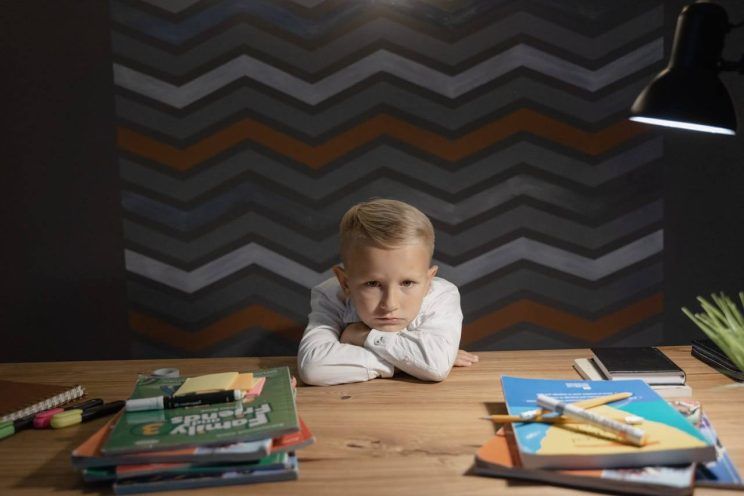How to Stop Procrastinating Homework
reviewed by Jo-ann Caballes
Updated on December 25, 2025
Sooner or later, every parent needs to find out how to stop procrastinating homework. While there’s no easy answer, there are plenty of things you can do to support your little one in establishing an organized learning plan without unnecessary delays. I’ll let you know what I’ve seen work best in my career as a teacher.
Key points
- Procrastination is a dangerous phenomenon with major negative side effects.
- To address the problem, you need to find the root causes, organize long homework into small tasks, provide frequent breaks, and offer a distraction-free environment.
- Private tutoring can help by building knowledge, boosting confidence, and associating studying with fun educational activities.
Why students procrastinate on homework
The most common reasons for procrastination on homework include getting overwhelmed, confused, disinterested, or disconnected from the task. Lack of confidence, fear of making mistakes, bad time management skills, and distractions in the environment also contribute. Without proper structure and incentives, students delay work that causes stress and frustration.

Another reason for procrastinating on homework is undiagnosed learning difficulties. Research by the Counseling and Clinical Psychology Journal shows that ADHD severely affects productivity. Individuals with ADHD have difficulty delaying gratification and shift responding to a variety of tasks, which can lead to postponing homework.
It’s crucial to identify the specific causes of procrastination for each child as that’s the key to solving the problem. Dr. James A. Barham, an education expert and the Senior Vice President of Academic Influence, confirms this.
“The key to figuring out how to stop procrastinating homework is to understand why it happens in the first place.”
Primary causes of homework procrastination
- Feeling overwhelmed by large, complex assignments
- Unclear instructions or expectations
- Weak time management and planning skills
- Fear of failure or public humiliation
- Lack of belief in personal abilities
- Low motivation and weak interest in the subject
- Learning gaps in foundational knowledge
- Difficulty focusing or controlling distractions
- Insufficient energy
- Lack of routine, structure, and accountability
What procrastination can lead to
In the short term, homework procrastination results in incomplete homework, poorly done assignments, inadequate practice, lower grades, and unnecessary stress. The long-term effects of procrastination are even more significant as it leads to knowledge gaps, a lack of confidence, and fear of school. Zippia states that unmanaged childhood procrastination becomes a lifetime habit, with 43% of adults procrastinating regularly.

Why is procrastination bad?
The main problems stemming from procrastination are:
- Worse academic performance: Procrastinating students have a 0.16 points lower GPA and score 0.21 and 0.17 points less on assignments and final papers, respectively.
- Stress and anxiety: Constantly unfinished work creates unease, turning into elevated levels of stress and emotional unwellness.
- Sleep deprivation: The effects of procrastination to students include studying at night, and insufficient sleep is associated with poor concentration, bad memory, cognitive impairment, depression, and more.
- Low self-esteem: As kids are continuously unprepared for school and miss deadlines, this damages their confidence in themselves, creating a vicious cycle.
- Lifelong procrastination: This habit can continue into adulthood if not properly addressed, causing long-term challenges at college, work, and life.
How to stop procrastinating on homework
- Identify where your child gets stuck
- Break homework into clear, small steps
- Create a simple to-do list
- Prime the environment
- Provide regular, short breaks
- Reward small victories and progress
- Make boring homework more engaging
Identify where your child gets stuck
Figuring out how to stop procrastinating for students starts with pinpointing the specific reasons as they’re different for each student. Observe your child while studying to identify what triggers the waste of time. Is it subject-related? Does it happen after hours of non-stop studying? Do surrounding noises increase the frequency?
Sometimes, procrastination happens because the student doesn’t understand the material, learning is disengaging, and they don’t have the confidence they can handle the assignment. One-on-one tutoring can help with all of these.
Stop procrastinating homework with Brighterly
The Brighterly math and reading platform offers 1:1 math, reading, and writing tutoring that is personalized to the specific needs of each student and includes reading and math homework help. This can be your answer to the question “How to avoid procrastination in homework?” for a number of reasons.
First, the Brighterly after school math program and reading program target both basic and advanced skills and customize the learning path in a way that addresses the unique challenges that the kid faces. This simultaneously builds knowledge and self-esteem, so students are more confident they can complete tasks and don’t postpone them.
Second, the reading and math tutors are not only professional, experienced teachers but also trained in how to incorporate game-based learning and make lessons fun and engaging. When children start associating studying and homework with entertainment, they’re eager to do it, as seen in Trustpilot reviews.

Brighterly provides reading worksheets and math worksheets absolutely free. They offer real-world, visually enhanced reading exercises and math problems that stimulate student engagement. They can be used online or offline, depending on how your child tends to study better to eliminate student procrastination.
Tutoring is available at affordable prices, starting at $17.30/class with an annual membership including 3 classes/week.
Break homework into clear, small steps
Another tactic that helps with how to not procrastinate homework at all ages is to turn complicated assignments into simple tasks. This avoids the feeling of overwhelmedness and helplessness that’s one of the main triggers of procrastination. Pavan Sampath, the COO and Managing Partner of Ascend Now, uses the following tricks to motivate his students.
“Another reason students tend to procrastinate on homework/academic tasks is the lack of feedback and rewards.”
Create a simple to-do list
Once you’ve broken homework into smaller steps, use these more manageable tasks to write down a list of what your child needs to get done. The list shouldn’t contain more than a dozen steps so that you don’t make your kid feel even more overwhelmed. You can group related tasks in one step.

Sit together, look at the steps, and analyze how easy it is to achieve each one of them. When your kid starts working through each task, cross it off the list. This creates a sense of accomplishment, success, and consequent reward, which helps eliminate procrastinating homework.
Prime the environment
A common reason why do students procrastinate is due to various distractions and triggers in the learning environment. For some kids, it’s enough to walk by them to divert their focus. Others frequently check social media. That’s why it’s crucial to provide a quiet, distraction-free space for your little learner memorizing multiplication tables or working on another assignment.
Erin Beers, 7th grade language arts teacher and resource creator from Cincinnati, supports these techniques.
“As a middle school teacher, I work with a wide array of different learners, and these simple strategies work well with procrastinating students.”
- Break Down Assignments. Feeling overwhelmed and under pressure is one of the biggest distractions. Sometimes you need to help students simplify larger tasks so they can feel the momentum of accomplishment.
- Open Spaces. Another strategy is to let your student stand at a high-top table or counter while working. This gives them more freedom to move their body while working. The goal here is to reduce feelings of constraint and pressure.
Set regular, short breaks
To help your child not procrastinate homework, remind them to take 5-minute breaks every 30 minutes. Use a timer to keep track. Let them take a short walk in the house and look through the window to clear up their mind. You can also offer them a small, nutritious snack, such as a fruit or some yogurt.
Reward even the smallest victories
A well-established reward system works miracles on overcoming procrastination in students. While it’s particularly effective with neurodivergent students, it helps everyone. That’s because children start associating completing tasks with specific benefits. For instance, offer pizza for good grades throughout the month, a PS5 game for A on the final exams, or a trip to Disneyland for a 700+ Math SAT score.
Varsha Naik, DP Math Teacher at School Lane Charter School, saw hundreds of procrastinating high schoolers grow up into successful adults. She considers finding students’ motivation to be the most effective way to beat procrastination.
“I have been teaching high school mathematics; my students usually procrastinate because they are teenagers. In my opinion, the child should be so important to properly understand the content.”
Make boring homework more engaging
Finally, incorporate fun elements, such as math games and math songs for kids, into your child’s learning routine. Even the toughest subjects, like math, can become less boring and more engaging. With these simple improvements, you can remove procrastination on homework as your kid starts enjoying studying.

How to not procrastinate on homework if it’s too boring?
To stop procrastination, disintegrate long, boring homework into short, manageable sessions. Start with the easiest task and leave the really hard ones for last. Mix learning new concepts with fun activities, like word games for kids. Take 5-minute breaks between sessions but quickly come back to studying once the break is over.
How does procrastination affect students?
Procrastination affects students negatively by creating stress at home, depriving them of sleep, worsening school performance, and reducing actual knowledge. The long-term impact should not be ignored either as it leads to anxiety, poor skills, and chronic procrastination.
Since you know how procrastination affects students, it’s important to act as soon as you see the first signs of this bad habit in your child.
How many elementary, middle, and high school students procrastinate?
Magoosh found that 86% of high school students delay working on assignments. If not overcome on time, this phenomenon continues beyond high school as 80-95% of college students procrastinate on coursework, according to the American Psychology Association.
Note: A significant percentage of elementary and middle school students procrastinate, but there are no specific statistics on this educational trend. If you want to find out more, you can read the Education Statistics and Trends article.
Conclusion: Help your child stop procrastinating homework
Procrastination on homework is a widely spread phenomenon among students, with major negative effects. It not only causes lower grades and less knowledge, but also leads to sleep deprivation and anxiety. But if you try the tips above, I’m sure you’ll be able to reduce your child’s procrastination and get them back on track.
And if you need professional help in making learning personalized, tangible, understandable, and exciting, you can check out Brighterly.
The Brighterly math and reading programs help you win against procrastination with:
✅ 1:1, tailored tutoring in core subjects
✅ Professional and fun teachers who individualize the learning approach
✅ Free worksheets to continue growing skills and confidence
Ready to give it a try? Book free lesson today to help your child build positive habits and focus on homework.






















